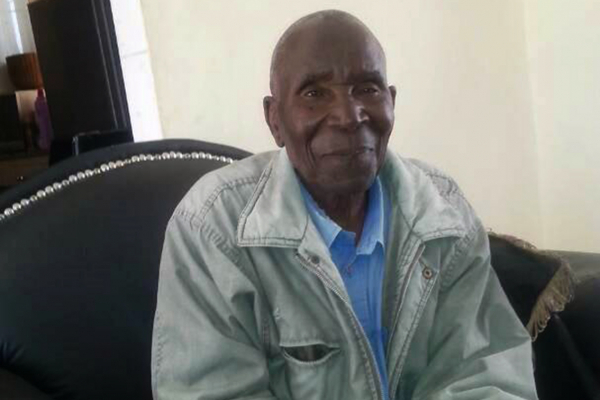
OVER the past decade Zimbabwe has experienced continuous drought spells resulting in famine in some parts of the country, with conservative estimates putting the number of people facing hunger annually at about 3 million.
BY RICHARD CHIDZA
Explanations have been given for the food shortages ranging from the El-Nino weather phenomenon to government’s haphazard and often-violent land redistribution exercise, but for 95-year-old Elliot Nkomo, the current generation’s demand for “bus-fare” for trips to the iconic and sacred Mtonjeni shrine is the reason behind the “disappearance of rains”.
In a country where life-expectancy has plummeted to under 35 years, turning 95 and still walking, albeit with the aid of a stick, becomes a cause for community wonder.
“I have watched my age-mates go, but I believe God has allowed me to stay this long for a purpose. If only our young people could listen and if only the elderly could take our place under a tree, rest and allow those with energy to run around and work,” Nkomo told NewsDay at a private function to celebrate his birthday last week.
Born in 1922, Nkomo quips: “I was a boy in the year of rinderpest but still we harvested. Now the rains are gone. Our elders would travel on foot from Mberengwa to Mtonjeni in Matopos. But when people (bus crews) began to demand bus fare for such sacred trips, the rains just dried up.”
Nkomo also watched liberation movements being set up, contributed to the war effort with information and material help, was arrested and sentenced to 16 years in prison for assisting the guerrillas but never got to serve time.
“The Rhodesians wanted to sweet-talk me into turning against the fighters. They wanted me to be their informer, so they allowed me to go. As a teacher, I was well-informed more than most of the people. I had to leave Mberengwa to live with my in-laws in Zvimba in order to avoid the tricky situation I found myself in,” he said with a smile.
- Chamisa under fire over US$120K donation
- Mavhunga puts DeMbare into Chibuku quarterfinals
- Pension funds bet on Cabora Bassa oilfields
- Councils defy govt fire tender directive
Keep Reading
“Instead the Rhodesians arrested my two teenage children. We had to seek the help of a Bulawayo lawyer to get the children released.”
Independence came and Nkomo says it is where “we lost it”.
“At independence we became too excited and forgot to take care of the country, maintain the standards and make sure our people and the children as well as those that will come after us will have a better life than we had,” he said.
“In the past two years I have had to sit and get taken care of. I am, however, still consulted as the children run around and make things happen for me. They have taken good care of me and I hope this continues. I have watched all my age-mates go, but believe it is God’s will that I am still around.”
Nkomo worked as a teacher for over 40 years up to 1994 at schools including Msume and Mnene. He said he owes his long-life to God and specifically the church.
“The church has been key to our survival and long life as a generation. We must respect it. Its rules and restrictions are important but the young generations listen very little,” he said with a chuckle indicating he had taken alcohol for a few years in his youth before dropping the habit altogether.
Nkomo said during his early years, he lived with his maternal grandparents but continuously shifted back to his father’s home. He completed his primary education in 1946 before proceeding to Msume Secondary for Standard 4 and 5. He then went to Mnene Mission, where he trained as a teacher and began his four-decade-long career as an educator across the Midlands and Masvingo at Nyamhande while helping with the liberation war effort.
“I had 14 children from two marriages. But now I have no idea as to the number of my grandchildren and great grandchildren. I have lost count. There are lots of them and I have to ask who their father or mother is,” he said amid laughter.
“I taught at Makuva Primary School for 11 years from 1957, went to Gwavava for a year before transferring to Gokwe in chief Njelele’s area.”
One of the nonagenarian’s sons, Tonderai, said his father has over 50 grandchildren and great-grandchildren.
It is here that Nkomo said he found his second love but laughs when asked to talk about it. It’s a subject that obviously tickles him, although he seemed not at liberty to talk about it.
“The family and its internal dynamics are sacred issues. We can talk about it to a certain degree,” he said.
“The children of today actually do not care about the country’s security. You actually hear them demanding war. It is not a nice thing. Many innocent people are killed.”











